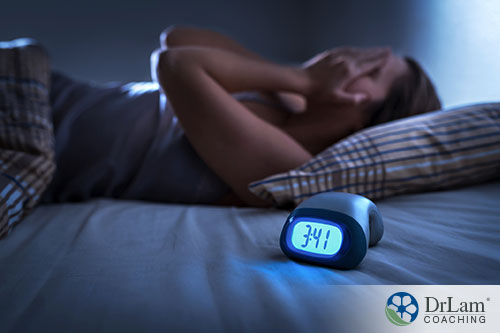 Some people are happy to get a “second wind,” suddenly finding they have more energy to complete a task or stay awake longer. But if you get a second wind when you are trying to sleep, you could have a problem on your hands. A second wind that keeps you up late at night can deprive your body of the sleep it needs to rest, repair, and rebalance cortisol after the stress of the day. And if you have adrenal fatigue, this is sleep you can’t do without.
Some people are happy to get a “second wind,” suddenly finding they have more energy to complete a task or stay awake longer. But if you get a second wind when you are trying to sleep, you could have a problem on your hands. A second wind that keeps you up late at night can deprive your body of the sleep it needs to rest, repair, and rebalance cortisol after the stress of the day. And if you have adrenal fatigue, this is sleep you can’t do without.
Good quality sleep is essential for adrenal fatigue recovery, and maintaining a suitable sleeping schedule is an important part of an overall sleep hygiene routine that will help your adrenals get stronger and your body repair and recharge after so much depletion. That’s why understanding the “second wind” that could happen during sleep, and how your sleep cycle is related to your cortisol levels, can help you achieve the kind of sleep that will allow for a full recovery.
Cortisol is your body’s main anti-stress hormone, and it is produced by your adrenal glands. It plays a role in blood pressure and blood sugar regulation, in the function of your heart and blood vessels, in suppressing the immune system once it has done its job, and in neutralizing inflammation. It is a very energizing hormone, and its levels fluctuate throughout the day in order to either wake you up or allow you to relax and wind down.
In a healthy person, cortisol levels are highest in the morning, between 6:00 a.m. and 8:00 a.m., in order to help you wake up and start your day. They are also supposed to be at their lowest between midnight and 4:00 a.m., which is when you should be sleeping. Between 10:00 p.m. and 1:00 a.m. is when the adrenals are working extra hard to help repair the body.
These cortisol levels and cycles can be severely disrupted if you have Adrenal Fatigue Syndrome (AFS), or any kind of dysregulation in your NeuroEndoMetabolic (NEM) Stress Response’s Hormone circuit. The Hormone circuit is one of six NEM circuits of organs and systems that work together to fight stress, with the other five being the Bioenergetics, the Neuroaffect, the Cardionomic, the Inflammation, and the Detoxification circuits.
The Hormone circuit is composed of the adrenal glands, the thyroid gland, and the gonads (female ovaries or male testes). All three components are regulated by the control center in the brain: the hypothalamus and the pituitary gland. With the adrenal glands, the hormone cascade that begins in the brain to end with the release of cortisol from the adrenals is called the hypothalamic-pituitary-adrenal (HPA) axis. It is activated when the hypothalamus senses the presence of stress in the body, signals to the pituitary gland to release ACTH, which then stimulates the adrenals to release cortisol.
In a healthy person, this happens without disruption, usually in response to acute stressors, which our bodies are accustomed to handling. The problem arises, however, when stress becomes chronic, whether it is physical or psychological. Then the HPA is constantly switched on, overworking the adrenals and engaging the rest of the Hormone circuit, leading to dysregulation and eventually adrenal fatigue.
Adrenal fatigue brings with it imbalances in cortisol production, at first increasing it in order to meet the growing demand, which is when you’re more likely to get a cortisol second wind, but eventually dropping it completely, when the adrenals are exhausted and can no longer function. A body without its main anti-stress fighter then has to compensate in other ways, and is left much more vulnerable than before.
Symptoms of AFS include fatigue, easily gaining weight and difficulty losing it, frequent colds and flu, hair loss, loss of libido, salt and sugar cravings, food and drug sensitivities, heart palpitations, brain fog, PMS, infertility, dry skin, anxiety, mild depression, hypoglycemia, and sleep disturbances.
With sleep disturbances, two types are common in AFS: sleep onset insomnia, where it is difficult to fall asleep in the first place, and sleep maintenance insomnia, where you do fall asleep but have a hard time staying asleep.
It’s common for those suffering from AFS to wake up in the middle of the night, usually around 2:00 a.m. and 3:00 a.m., and then have difficulty falling back asleep. Also, many people with adrenal fatigue experience relative hypoglycemia during the night, which can wake them up.
 It’s also good to keep in mind that between 11:00 p.m. and 1:00 a.m., your adrenals kick in for a second wind. You may have noticed this yourself, that if you don’t go to bed by 10:00 p.m., when it’s the optimal time for people to go to sleep, you pass through the sleepiness phase only to then feel more awake afterward. By the time this second wind kicks in, it might be difficult to fall asleep at all until it’s over, at around 1:00 a.m.
It’s also good to keep in mind that between 11:00 p.m. and 1:00 a.m., your adrenals kick in for a second wind. You may have noticed this yourself, that if you don’t go to bed by 10:00 p.m., when it’s the optimal time for people to go to sleep, you pass through the sleepiness phase only to then feel more awake afterward. By the time this second wind kicks in, it might be difficult to fall asleep at all until it’s over, at around 1:00 a.m.
This is especially the case if you’re in the earlier stages of AFS, when your adrenals are still able to produce the high levels of cortisol being demanded in order to cope with the chronic stress your body is facing.
Another type of second wind that happens to those with adrenal fatigue is the afternoon surge that could last till the evening, keeping you awake even though you have no energy. This can also show up as feeling wired and tired all day long, and yet when it comes to bedtime, even though you’re sleepy at 9:00 or 10:00 p.m., you still resist going to bed.
Both of these types of second wind can be avoided by maintaining a very strict bedtime schedule, and always going to bed at (or slightly before) 10:00 p.m. Doing this, along with a few other sleep hygiene techniques, will give you a much better chance at getting a full night’s rest.
And, finally, the normal surge in cortisol levels in the morning can sometimes come a little earlier than usual, waking you up prematurely. For all adrenal fatigue sufferers, we recommend bypassing this type of cortisol surge, whether it comes earlier than it should or if it comes during the regular window between 6:00 and 8:00 a.m., by trying to sleep in until 8:30 or 9:00 a.m.
We understand it’s a little difficult to make yourself sleep this much, especially if you’re not used to it, but with a few adjustments and remedies, it can be done, and it will make all the difference in your recovery.
Although it’s not necessary, you can also ask your physician to test your cortisol levels throughout the day and night to see whether or not you do get surges. This involves getting a kit to help you collect your saliva four or five times in 24 hours: at bedtime, early morning, mid-afternoon, late afternoon, and when/if you wake up in the middle of the night. Then send the samples back to get tested.
Pay special attention to the results of the night time sample, and compare it to the bedtime sample, as it is supposed to have the same amount of cortisol or even lower. If it’s higher, then you’re dealing with a middle-of-the-night second wind that might require a little extra help to overcome. Also, if your bedtime samples reveal high cortisol levels, that might be why you’re suffering from sleep onset insomnia and you may also require a little help with that.
There are several steps you can take to avoid getting a second wind from cortisol surges and also to get better quality sleep overall.
First of all, you should try to avoid caffeine as much as possible during adrenal fatigue recovery, as it can not only keep you awake, but it can actually tax your adrenals even more. To avoid the hypoglycemic episodes that can come at night when dealing with AFS, try to eat a light snack that contains healthy fats, such as soaked nuts and seeds, right before bed.
 Try to abstain from using your digital devices at least two hours before bed. You can do something more calming instead, such as meditating, doing some very gentle adrenal breathing exercises, or reading a relaxing book that is not too engaging. Keep your bedroom cool and dark, and don’t turn on the lights if you get up in the night to use the toilet. Use a nightlight instead. To avoid waking up to use the toilet at night, you should stop drinking liquids a couple of hours before bed, though you must stay well-hydrated during the day.
Try to abstain from using your digital devices at least two hours before bed. You can do something more calming instead, such as meditating, doing some very gentle adrenal breathing exercises, or reading a relaxing book that is not too engaging. Keep your bedroom cool and dark, and don’t turn on the lights if you get up in the night to use the toilet. Use a nightlight instead. To avoid waking up to use the toilet at night, you should stop drinking liquids a couple of hours before bed, though you must stay well-hydrated during the day.
And, as already mentioned, it is important to maintain a strict sleeping schedule, every day of the week. Go to bed by 10:00 p.m. and try to sleep in until 8:30 or 9:00 a.m.
Taking a phosphorylated serine supplement four to six hours before bed can help you get to sleep, and taking it right at bedtime can help you stay asleep during the night. This cortisol-regulating supplement works by suppressing the pituitary gland so it stops telling your adrenals to make more cortisol. Beware not to take this supplement without first consulting your doctor as some people might have different reactions when taking phosphorylated serine.
Hydrolyzed casein is a faster-acting supplement that can help calm your brain, and you can take it whenever your cortisol levels are high, whether during the day or at night. It is a milk-based product, so avoid it if you are intolerant.
These two supplements can be taken together, but you must make sure you only do so under the guidance of an experienced health professional. When you have AFS, you are at a higher risk for paradoxical reactions and you may need different supplements or dosing depending on your condition. In general, you shouldn’t rely solely on supplements to help you recover. They should only be a temporary boost alongside the diet and lifestyle changes that will do most of the recovery work.
© Copyright 2020 Michael Lam, M.D. All Rights Reserved.
If you’ve been under a lot of stress, or you have adrenal fatigue, your cortisol levels may be higher than normal. This can give you a “second wind” that can keep you awake or wake you up when you’re sleeping. Practicing strict sleep hygiene and balancing out your cortisol levels are two of the steps you can take to help prevent it.
